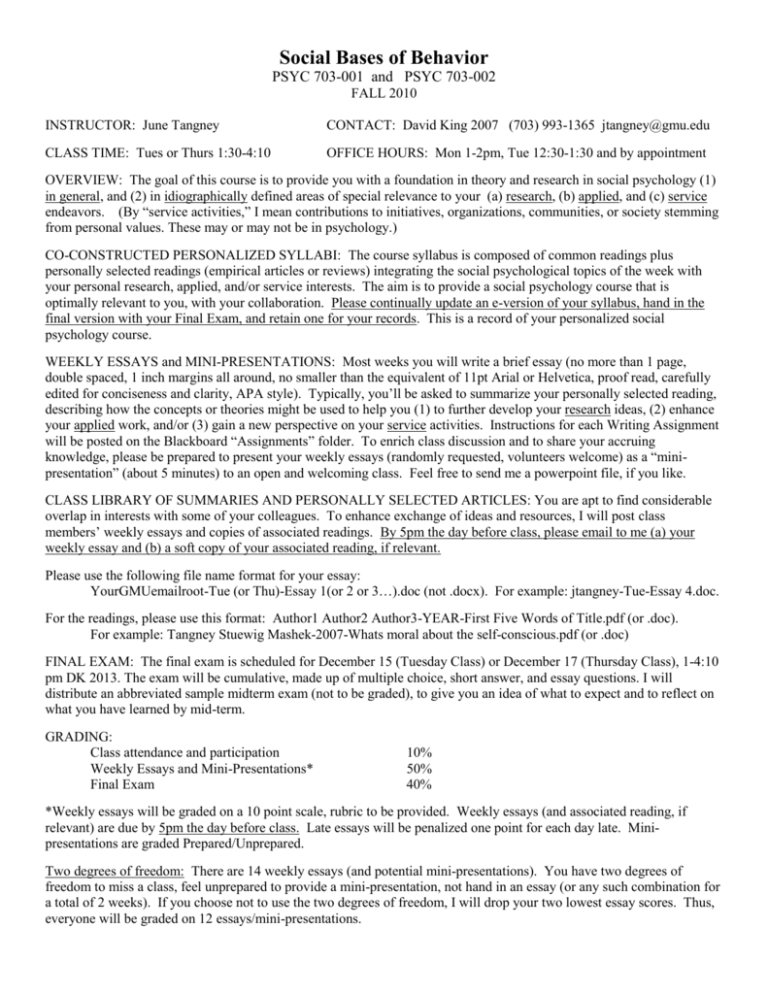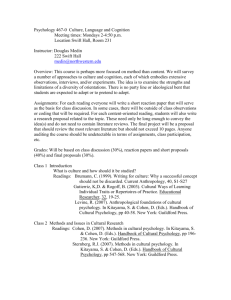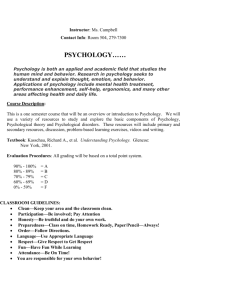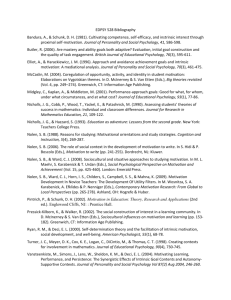SOCIAL AND COGNITIVE FOUNDATIONS OF CLINICAL
advertisement

Social Bases of Behavior PSYC 703-001 and PSYC 703-002 FALL 2010 INSTRUCTOR: June Tangney CONTACT: David King 2007 (703) 993-1365 jtangney@gmu.edu CLASS TIME: Tues or Thurs 1:30-4:10 OFFICE HOURS: Mon 1-2pm, Tue 12:30-1:30 and by appointment OVERVIEW: The goal of this course is to provide you with a foundation in theory and research in social psychology (1) in general, and (2) in idiographically defined areas of special relevance to your (a) research, (b) applied, and (c) service endeavors. (By “service activities,” I mean contributions to initiatives, organizations, communities, or society stemming from personal values. These may or may not be in psychology.) CO-CONSTRUCTED PERSONALIZED SYLLABI: The course syllabus is composed of common readings plus personally selected readings (empirical articles or reviews) integrating the social psychological topics of the week with your personal research, applied, and/or service interests. The aim is to provide a social psychology course that is optimally relevant to you, with your collaboration. Please continually update an e-version of your syllabus, hand in the final version with your Final Exam, and retain one for your records. This is a record of your personalized social psychology course. WEEKLY ESSAYS and MINI-PRESENTATIONS: Most weeks you will write a brief essay (no more than 1 page, double spaced, 1 inch margins all around, no smaller than the equivalent of 11pt Arial or Helvetica, proof read, carefully edited for conciseness and clarity, APA style). Typically, you’ll be asked to summarize your personally selected reading, describing how the concepts or theories might be used to help you (1) to further develop your research ideas, (2) enhance your applied work, and/or (3) gain a new perspective on your service activities. Instructions for each Writing Assignment will be posted on the Blackboard “Assignments” folder. To enrich class discussion and to share your accruing knowledge, please be prepared to present your weekly essays (randomly requested, volunteers welcome) as a “minipresentation” (about 5 minutes) to an open and welcoming class. Feel free to send me a powerpoint file, if you like. CLASS LIBRARY OF SUMMARIES AND PERSONALLY SELECTED ARTICLES: You are apt to find considerable overlap in interests with some of your colleagues. To enhance exchange of ideas and resources, I will post class members’ weekly essays and copies of associated readings. By 5pm the day before class, please email to me (a) your weekly essay and (b) a soft copy of your associated reading, if relevant. Please use the following file name format for your essay: YourGMUemailroot-Tue (or Thu)-Essay 1(or 2 or 3…).doc (not .docx). For example: jtangney-Tue-Essay 4.doc. For the readings, please use this format: Author1 Author2 Author3-YEAR-First Five Words of Title.pdf (or .doc). For example: Tangney Stuewig Mashek-2007-Whats moral about the self-conscious.pdf (or .doc) FINAL EXAM: The final exam is scheduled for December 15 (Tuesday Class) or December 17 (Thursday Class), 1-4:10 pm DK 2013. The exam will be cumulative, made up of multiple choice, short answer, and essay questions. I will distribute an abbreviated sample midterm exam (not to be graded), to give you an idea of what to expect and to reflect on what you have learned by mid-term. GRADING: Class attendance and participation Weekly Essays and Mini-Presentations* Final Exam 10% 50% 40% *Weekly essays will be graded on a 10 point scale, rubric to be provided. Weekly essays (and associated reading, if relevant) are due by 5pm the day before class. Late essays will be penalized one point for each day late. Minipresentations are graded Prepared/Unprepared. Two degrees of freedom: There are 14 weekly essays (and potential mini-presentations). You have two degrees of freedom to miss a class, feel unprepared to provide a mini-presentation, not hand in an essay (or any such combination for a total of 2 weeks). If you choose not to use the two degrees of freedom, I will drop your two lowest essay scores. Thus, everyone will be graded on 12 essays/mini-presentations. The final course grades will be determined by using the scale below: A+ 98-100 A 93-97 A- 90-92 B 83-86 B- 80-82 C+ 77-79 C- 70-72 D 60-69 F 0-59 B+ C 87-89 73-76 DROPPING/ADDING THE COURSE: The last day to add the course is September 14. The last day to drop the course is October 1 (September 14 with no tuition penalty). ACADEMIC INTEGRITY AND THE HONOR CODE: GMU is an Honor Code university; please see the University Catalog for a full description of the code and the honor committee process. The principle of academic integrity is taken very seriously and violations are treated gravely. What does academic integrity mean in this course? Essentially this: when you are responsible for a task, you will perform that task. When you rely on someone else’s work in an aspect of the performance of that task, you will give full credit in the proper, accepted form. All aspects of this course are bound by the GMU Honor Code which states that, “Student members of the George Mason University community pledge not to cheat, plagiarize, steal, or lie in matters related to academic work.” All students are expected to be familiar with and abide by the University Honor Code. Any student who engages in scholastic dishonesty, inadvertently or not, will be reported directly to the Honor Committee. Another aspect of academic integrity is the free play of ideas. Vigorous discussion and debate are encouraged in this course, with the firm expectation that all aspects of the class will be conducted with civility and respect for differing ideas, perspectives, and traditions. When in doubt, please ask for guidance and clarification. GMU EMAIL ACCOUNTS: Students must activate their GMU email accounts and frequently check these accounts to receive important University information, including messages related to this class. OFFICE OF DISABILITY SERVICES: If you are a student with a disability and you need academic accommodations, please see me and contact the Office of Disability Services (ODS) at 993-2474. All academic accommodations must be arranged through the ODS. http://ods.gmu.edu OTHER USEFUL CAMPUS RESOURCES: Writing Center: A114 Robinson Hall; (703) 993-1200; http://writingcenter.gmu.edu University Libraries: “Ask a Librarian” http://library.gmu.edu/mudge/IM/IMRef.html Counseling and Psychological Services (CAPS): (703) 993-2380; http://caps.gmu.edu University Policies: The University Catalog, http://catalog.gmu.edu, is the central resource for university policies affecting student, faculty, and staff conduct in university affairs. REQUIRED TEXT: Gilovich, T., Keltner, D., & Nisbett, R. E. (2011). Social psychology (2nd Edition). New York: W.W. Norton. RECOMMENDED RESOURCES: Fiske, S. T., Gilbert, D. T., & Lindzey, G. (Eds.),(2010). Handbook of social psychology (5th edition). New York: Wiley. John, O.P., Robins, R.W., & Pervin, A.L. (Eds.) (2008). Handbook of personality: Theory and research (3rd edition). New York: Guilford Press. Lopez, S.J., & Snyder, C.R. (Eds.) (2009). Oxford handbook of positive psychology (2nd edition). New York: Oxford University Press. Leary, M., & Tangney, J.P. (Eds.) (2003). Handbook of self and identity. New York: Guilford Press. Maddux, J. E. & Tangney, J. P. (Eds.) (2010). Social Psychological Foundations of Clinical Psychology. New York: Guilford Press. Greenberg, J., Koole, S. L., & Pyszczynski, T. (Eds.), Handbook of experimental existential psychology. New York: Guilford Press. SCHEDULE OF TOPICS AND READINGS 8/31 & 9/2 Introductions and Course Overview; The Social Psychology of Morality: Moral Emotion, Cognition, and Behavior -- Part I Locating Social Psychology on the Interdisciplinary Map -- Personal Research, Applied and Service Interests – Overview of Course -- A Cognitive-Affective Model of Morality 9/7 & 9/9 The Social Psychology of Morality: Moral Emotion, Cognition, and Behavior -- Part II Moral Emotions (Shame, Guilt, Empathy) -- Moral Cognitions (Reasoning vs. Biases) – Situational Factors Required Reading: Shweder, R. A., Much, N. C., Mahapatra, M. & Park, L. (1997). The “Big Three” of morality (Autonomy, Community, Divinity) and the “Big Three” explanation of suffering. In A. Brandt & P. Rozin (Eds.), Morality and health (pp. 119-169). New York: Routledge. Tangney, J.P., Stuewig, J., & Mashek, D. J. (2007). What’s moral about the self-conscious emotions? In J. L. Tracy, R. W. Robins, & J. P. Tangney, (Eds.) The self-conscious emotions: Theory and research (pp. 21-37). New York: Guilford Press. Tangney, J.P., & Mashek, D.J. (2004). In search of the moral person: Do you have to feel really bad to be good? In J. Greenberg, S. L. Koole, & T. Pyszczynski (Eds.), Handbook of experimental existential psychology (pp.156-166). NY: Guilford Press. Writing Assignment #1 – Research, Applied, and Service Interests 9/14 & 9/16 Social Psychology: Historical Context, Conceptual Themes, Breadth of Application Power of the Situation – Importance of Construals (Schemas and Stereotypes) – Automatic vs. Controlled Processing – The Rebirth of the Unconscious – Evolution – Culture – Gender Required Reading: Gilovich, Keltner & Nisbett – Chapter 1 Recommended Reading: Jones, E. E. (1998). Major Developments in Five Decades of Social Psychology. In D.T. Gilbert, S.T. Fiske, & G. Lindzey (Eds.), The handbook of social psychology (fourth edition) (pp. 3-57). New York: MacGraw-Hill. Writing Assignment #2 – How Do I Imagine Social Psychology Might Be Relevant to Me? 9/21 & 9/23 The Self Roots of the self – Culture and the Self – Self Knowledge – Illusions and Biases – Self Esteem – Self Presentation – Social Desirability – Self-conscious Emotions Revisited Required Reading: Gilovich, Keltner & Nisbett – Chapter 3 *[Enter self-selected article relevant to psychology of the self – e.g., ] Recommended: Baumeister, R.F. (1998). The self. In D.T. Gilbert, S.T. Fisk, & G. Lindzey (Eds.), The handbook of social psychology (fourth edition) (pp. 680-740). New York: MacGraw-Hill. Writing Assignment #3 – Summarize self-selected article and specify linkage to R, A, and/or S Interests 9/28 & 9/30 Attributions and Counterfactual Thinking Causal Attributions – Counterfactual Reasoning – Self-serving Bias – Fundamental Attribution Error – Dispositions: Fixed or Flexible Required Reading: Gilovich, Keltner & Nisbett – Chapter 4 *[Enter self-selected article relevant to one or more of the above topics] Recommended: Niedenthal, P., Tangney, J. P., & Gavanski, I. (1994). "If only I weren't" versus "If only I hadn't": Distinguishing shame and guilt in counterfactual thinking. Journal of Personality and Social Psychology, 67, 585-595. Writing Assignment #4 – Summarize self-selected article and specify linkage to R, A, and/or S Interests 10/5 & 10/7 Social Judgment Biases in Social Judgment – Order Effects – Framing Effects – Confirmation Bias – Role of Schemas – Availability Heuristic – Representativeness Heuristic Required Reading: Gilovich, Keltner & Nisbett – Chapter 5 *[Enter self-selected article relevant to one or more of the above topics] Recommended: Gilovich, T.D., & Griffin, D.W. (2010). Judgment and decision making. In S.T. Fiske, D.T. Gilbert, & G. Lindzey (Eds.), Handbook of social psychology (fifth edition) (pp. 542-588). New York:Wiley. Writing Assignment #6 – Summarize self-selected article and specify linkage to R, A, and/or S Interests 10/12 It’s a Monday!!! No Class 10/19 & 10/14 Attitudes, Behavior, and Rationalization Predicting Attitudes from Behavior – Attitudinal Conflict – Cognitive Dissonance – Self-perception Theory – Justification Theory – Terror Management Theory Required Reading: Gilovich, Keltner & Nisbett – Chapter 6 *[Enter self-selected article relevant to one or more of the above topics] Recommended: Pyszczynski, T., Greenberg, J., & Goldenberg, J. L. (2003). Freedom vs. fear: On the defense, growth, and expansion of the self. In M. Leary, & J. P. Tangney (Eds.) Handbook of self and identity (pp. 314-343). New York: Guilford Press. Writing Assignment #7 – Summarize self-selected article and specify linkage to R, A, and/or S Interests 10/26 & 10/21 Emotion Will the Real Emotion Please Stand Up? – Facial Expressions of Emotion – Culture and Emotion – Emotion in Relationships – Emotion and Social Judgments – Emotion and Reasoning –Two Factor Theory of Emotion -Physiological Aspects of Emotion – Problematic Social Emotions Required Reading: Gilovich, Keltner & Nisbett – Chapter 7 *[Enter self-selected article relevant to one or more of the above topics] Recommended: Keltner, D., & Lerner, J.S. (2010). Emotion. In S.T. Fiske, D.T. Gilbert, & G. Lindzey (Eds.), Handbook of social psychology (fifth edition) (pp. 317-352). New York:Wiley. Writing Assignment #8 – Summarize self-selected article and specify linkage to R, A, and/or S Interests 11/2 & 10/28 Social Influence and Persuasion Conformity – Obedience to Authority – Compliance – What are Attitudes? – Attitude Change – Resistance to Change Required Reading: Gilovich, Keltner & Nisbett – Chapters 8 and 9 *[Enter self-selected article relevant to one or more of the above topics] Recommended: Albarracin, D., & Vargas, P. (2010). Attitudes and persuasion: From biology to social responses to persuasive intent. In S.T. Fiske, D.T. Gilbert, & G. Lindzey (Eds.), Handbook of social psychology (fifth edition) (pp. 394-427). New York:Wiley. Writing Assignment #9 – Summarize self-selected article and specify linkage to R, A, and/or S Interests 11/9 & 11/4 Psychology of Change; Psychology Attraction Stages of Change – Change as a Process – Reactance Effects -- Motivation to Change – Role of Values – Motivational Interviewing – Proximity and Attraction – Similarity Effects – Physical Attractiveness Required Reading: Gilovich, Keltner & Nisbett – Chapter 10 Prochaska, J. O., & Prochaska, J. M. (in press). Self-Directed Change: A Transtheoretical Model. In J. E. Maddux & J. P. Tangney (Eds.), Social psychological foundations of Clinical Psychology. New York: Guilford Press. Hettema, J., Steele, J. & Miller, W. R. (2005). Motivational Interviewing. Annual Review of Clinical Psychology, 1, 91-111. Recommended: Weick, K. E., & Quinn, R. E. (1999). Organizational change and development. Annual Review of Psychology, 50, 361-386. Schneider, B., Brief, A. P., & Guzzo, R. A. (1996). Creating a climate and culture for sustainable organizational change. Organizational Dynamics, 24, 7-19. Writing Assignment #10 –Discuss linkages to R, A, and/or S Interests 11/16 & 11/11 Relationships Need to Belong – Attachment Theory – Structure of Relationships – Romantic Relationships – Community Relationships Required Reading: Gilovich, Keltner & Nisbett – Chapter 11 *[Enter self-selected article relevant to one or more of the above topics] Recommended: Clark, M.S., & Lemay, E.P. (2010). Close relationships. In S.T. Fiske, D.T. Gilbert, & G. Lindzey (Eds.), Handbook of social psychology (fifth edition) (pp. 898-940). New York:Wiley. Mashek, D. J., Stuewig, J., *Furukawa, E., & Tangney, J. P. (2006). Psychological and behavioral implications of connectedness to communities with opposing beliefs and values. Journal of Social and Clinical Psychology, 25, 382-407. Writing Assignment #11 – Summarize self-selected article and specify linkage to R, A, and/or S Interests 11/23 & 11/18 Stereotyping, Prejudice, and Discrimination Intergroup Bias – Racism – The IAT – Economic Perspective – Motivational Perspective- Social Identity Theory – Frustration-Aggression – Cognitive Perspective – Conservation – Biased Assessments – Automatic vs. Controlled Processing Required Reading: Gilovich, Keltner & Nisbett – Chapter 12 *[Enter self-selected article relevant to one or more of the above topics] Recommended: Dovidio, J., & Gaertner, S.L. (2010). Intergroup bias. In S.T. Fiske, D.T. Gilbert, & G. Lindzey (Eds.), Handbook of social psychology (fifth edition) (pp. 1084-1121). New York:Wiley. Writing Assignment #12 – Summarize self-selected article and specify linkage to R, A, and/or S Interests 11/25 Thanksgiving!!! No Class!!! 11/30 & 12/2 Aggression, Altruisim, and Cooperation Situational Determinants of Aggression – Social Information Processing – Evolution – Gender and Aggression – Empathy and Altruism – Situational Determinants of Altruism – Social Information Processing – Evolution – Gender and Altruism – Cooperation – Prisoner’s Dilemma and Beyond Required Reading: Gilovich, Keltner & Nisbett – Chapter 13 *[Enter self-selected article relevant to one or more of the above topics] Recommended: Bushman, B.J., & Huesmann, L.R. (2010). Aggression. In S.T. Fiske, D.T. Gilbert, & G. Lindzey (Eds.), Handbook of social psychology (fifth edition) (pp. 833-863). New York:Wiley. Leary, M.R. (2010). Affiliation, acceptance, and belonging: The pursuit of interpersonal connection. In S.T. Fiske, D.T. Gilbert, & G. Lindzey (Eds.), Handbook of social psychology (fifth edition) (pp. 864-897). New York:Wiley. Writing Assignment #13 – Summarize self-selected article and specify linkage to R, A, and/or S Interests 12/7 & 12/9 Groups Social Facilitation – Deindividuation – Group Decision-Making – Group-based Emotions Required Reading: Gilovich, Keltner & Nisbett – Chapter 14 *[Enter self-selected article relevant to one or more of the above topics] Recommended: Hackman, J.R., & Katz, N. (2010). Group behavior and performance. In S.T. Fiske, D.T. Gilbert, & G. Lindzey (Eds.), Handbook of social psychology (fifth edition) (pp. 1208-1251). New York:Wiley. Yzerbyt, V., & Demoulin, S. (2010). Intergroup relations 1. In S.T. Fiske, D.T. Gilbert, & G. Lindzey (Eds.), Handbook of social psychology (fifth edition) (pp. 1024-1083). New York:Wiley. Pfeffer, J. (1998). Understanding organizations: Concepts and controversies. In D.T. Gilbert, S.T. Fisk, & G. Lindzey (Eds.), The handbook of social psychology (fourth edition) (pp 733-777). New York: MacGraw-Hill. Writing Assignment #14 – Summarize self-selected article and specify linkage to R, A, and/or S Interests Final Exam – December 15 (Tuesday Class) or December 17 (Thursday Class), 1-4:10 pm DK 2013. HAPPY HOLIDAYS!!!





